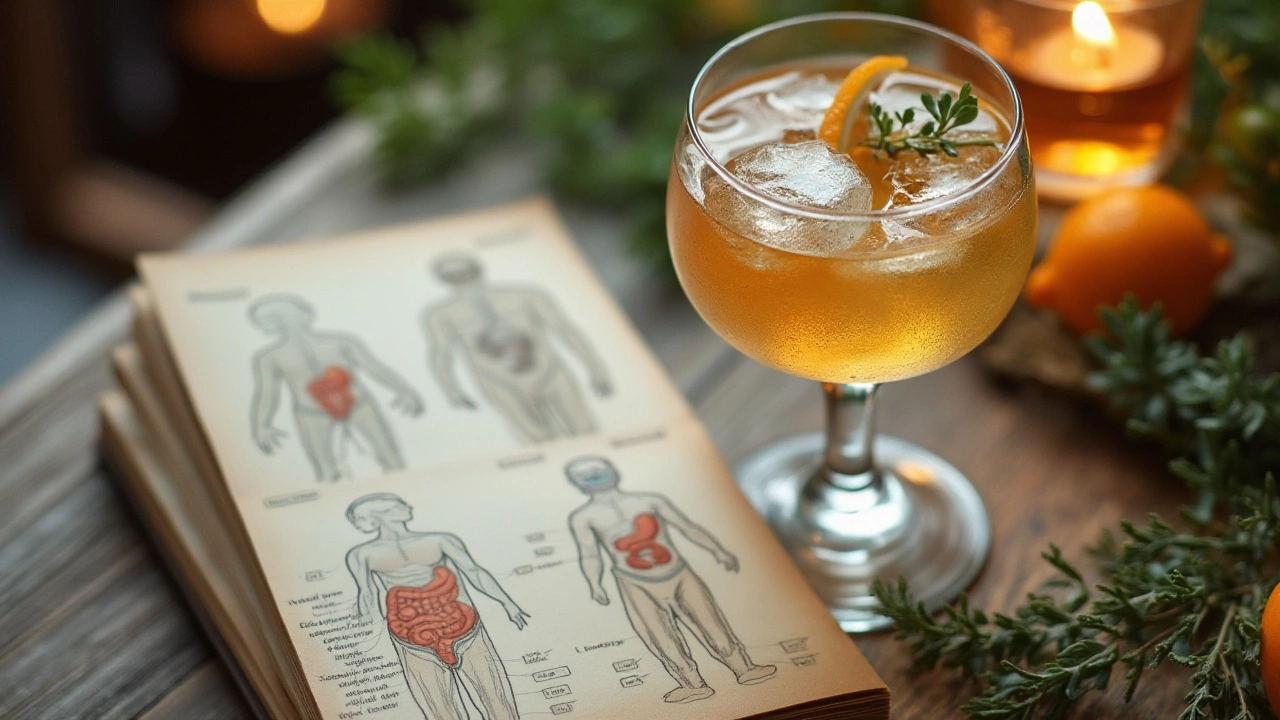When it comes to enjoying a drink, few take the time to consider how alcohol might be affecting their gut. It's easily forgotten amid the clinking glasses and cheerful toasts. Yet, understanding the role different spirits play in digestive health can make a world of difference.
The conversation often revolves around finding a balance that allows for enjoyment without adverse consequences. This article sets out to uncover which alcohols, particularly focusing on spirits like gin, are tougher on your gut and why.
Whether you're about to embark on a delightful gin distillery tour or just curious about your next cocktail choice, a little insight into the effects of your favorite spirits can go a long way. Let's explore which drinks might deserve your caution and which ones you can sip a little more freely.
- Alcohol and Gut Health: A Complex Relationship
- The Good, the Bad, and the Worst: Spirits Ranked
- Gin: A Gentler Spirit for the Gut?
- Tips for Navigating Distillery Tours Wisely
- Balancing Indulgence and Gut Well-being
Alcohol and Gut Health: A Complex Relationship
The relationship between alcohol and gut health is as intricate as it is fascinating. Our gut, home to trillions of bacteria, plays a crucial role not just in digestion, but in immunity and mental health too. Alcohol, when consumed, doesn't just stay in your stomach. It travels throughout your digestive system, interacting with these bacteria. This can have both short-term and long-lived impacts on gut health. When alcohol enters the gut, it often begins to alter the delicate balance of beneficial microbes, sometimes leading to inflammation. This inflammation can manifest in various forms, ranging from mild discomfort to more serious digestive issues.
It's essential to recognize that different types of alcohol can have varying impacts on the gut. Beer, wine, and spirits like gin each have unique compositions. Wine, for instance, contains polyphenols which can sometimes aid in promoting good bacteria in moderate amounts. Yet, on the flip side, stronger spirits are often higher in alcohol content and can be harsher on the gut lining, occasionally leading to more pronounced disturbances. Studies indicate that excessive consumption might alter the gut microbiome - a tricky situation as an imbalanced gut microbiota has been linked to conditions such as leaky gut syndrome and even mental health disorders.
Dr. Kate Scarlata, a respected registered dietitian, once noted that "the gut is really the gateway to health." Her insight highlights how critical maintaining a balanced microbiome is, especially with the added challenge of alcohol. If we delve into spirits, stronger forms like vodka and gin, known for having high alcohol concentrations, can potentially sterilize the natural flora, causing disruptions in gut harmony. The secret lies not only in the type but also in the amount consumed. A glass might offer more than just an evening enjoyment; it can affect long-term health if not taken cautiously.
Disturbingly, not all effects of alcohol on the gut are visible or immediate. Some individuals can consume alcohol for years with minimal discomfort, only to experience issues later on. This unpredictability is what makes understanding the gut-alcohol relationship so crucial. In instances where the gut lining becomes inflamed from excessive drinking, it could lower the gut's ability to absorb crucial nutrients efficiently. Over time, this malabsorption can lead to deficiencies, impacting overall wellbeing. For those with pre-existing conditions, such as irritable bowel syndrome, the role of alcohol becomes even more pivotal, often exacerbating symptoms.
Supporting your gut health, while enjoying alcohol moderately, involves making informed choices about what you're drinking and in what quantities. While gin might be a feature in quaint gin distillery tours, knowing how it interacts within your body ensures not just enjoyment but well-being. Consider incorporating practices that support gut health, such as including fermented foods in your diet, which are known to bolster gut bacteria. Staying educated and listening to your body might just be the key to preserving your gut health amid life's festivities.
The Good, the Bad, and the Worst: Spirits Ranked
Choosing the right spirit can significantly influence how your gut feels. Let's explore which beverages are relatively friendly and which can wreak havoc on your digestive system. It's crucial to remember that while enjoying spirits can be part of a vibrant social life, the impact on health is not universal for everyone. Starting on a positive note, gin, a staple of many distillery tours, is often considered less harsh on the gut due to its simple botanical composition. Made predominantly of juniper berries, it is typically free of additives and impurities found in some other spirits. As a distilled beverage, it usually has fewer congeners—impurities formed during fermentation that can cause digestive irritation.
Whiskey, on the other hand, while adored by many for its rich and varied flavors, tends to include more congeners, especially darker varieties. These compounds might contribute to not only unpleasant hangovers but also gut discomfort. It holds a middle ground, appreciated for its craftsmanship and variety, yet still calls for moderation if one aims to avoid digestive distress. Vodka is another spirit that often stands as a cleaner option, boasting a straightforward distillation process. When consumed in its purer forms, it may have a less taxing effect on the gut. However, flavored vodkas can reintroduce potential gut-wrenching additives, turning an otherwise benign drink into a minefield.
Exploring the Bottom of the Bottle
Rum often finds itself at the till end when ranking spirits by digestive impact. Due to its sugar content and often complex aging process, it can stir up stomach troubles for those with sensitive guts. The sweet allure of rum is part of its charm, but it also makes it more likely to cause issues, especially when mixed into sugary cocktails like daiquiris or mojitos. The combination with sodas and mixers compounds its potential negative effects. Tequila, synonymous with fiery fun, rounds off the list. Silver or blanco tequila sits slightly better on the gut than its aged counterparts, due to fewer congeners. Yet, like rum, it's often paired with mixers or enjoyed in margaritas, which can amplify any unwanted gut reactions.
According to Dr. Michael Mosley, a respected voice in health, "The quality and quantity of alcohol intake have varied effects on the gut microbiome, which plays a role in many aspects of health."
To distill the insight into actionable tips, choose spirits wisely, keeping an eye on purity and preparation. As gin and vodka emerge as friendlier options, they often serve as safe bets for those sensitive to gut health risks. Meanwhile, spirits like rum and tequila should perhaps be approached with a bit more caution, particularly when mixed with sugary companions. The essence of selecting alcohol lies in understanding both its enjoyment and its health implications, a vital balance in maintaining well-being while savoring life's social moments.

Gin: A Gentler Spirit for the Gut?
Gin holds a fascinating history that stretches back centuries, entwined with tales of medicinal uses and even controversy. Crafted primarily from juniper berries, gin's unique botanical base might provide it with an edge when it comes to being a potentially gentler spirit on your gut. Juniper berries have been used in herbal medicine for their anti-inflammatory properties, which could, in theory, contribute to reducing inflammation in the gut when consumed in moderation. This doesn't mean gin is a health tonic by any means, but it does suggest that its effects might not be as harsh as other alcohols. Historically, gin was referred to as 'mother's ruin' due to its popularity and perceived influence on public health in 18th century England. Yet, today, it is appreciated as a refined beverage enjoyed globally.
Beyond its botanical origin, how gin is consumed also matters. It's often served with mixers like tonic water, which is low in sugar compared to soda or juice, giving gin cocktails an advantage in digestive terms. Some who love their gin will tell you that the range of flavors—thanks to the different herbs and spices used—makes it a versatile choice that is easier on the stomach. Of course, these perceived benefits are only applicable in moderation; overindulgence in any alcohol, gin included, can be taxing on the digestive system.
Dr. Sarah Jarvis, a general practitioner and clinical director of Patient.info, notes, "The gut microbiome is a complex and delicate system affected by diet and lifestyle, and gin in moderation might avoid the worst of the damage compared to higher sugar alternatives." Whether it lives up to its reputation as a friendlier option for the gut, it still should be consumed wisely. Understanding these nuances allows gin enthusiasts to enjoy distillery tours and tastings with more assurance. It's important to remember that individual responses can vary; what's gentle for one may not be for another. Exploring gin distilleries is not just an opportunity to sample different gins but also to learn about the craftsmanship and the ingredients that might contribute to it being perceived as a gentler spirit.
Tips for Navigating Distillery Tours Wisely
Nothing quite compares to the enchantment of a gin distillery tour. You're not just exploring; you're delving into a world filled with aromas, flavors, and craftsmanship that truly brings spirits to life. But, immersing yourself in this experience does require some thoughtful planning, especially if you're looking to maintain a healthy gut. Before setting out, consider your approach. Begin by eating a decent meal beforehand, something rich in fiber and protein, which can slow the absorption of alcohol. This small step can make your distillery tour more enjoyable and less taxing on your gut health.
Another tip is to stay hydrated throughout the tour. Between tastings, sip on water or herbal teas; they can help balance the harsh effects of spirits on your body. When navigating through the exciting world of gin, it’s easy to lose track of how many samples you've had, so try pacing yourself. Listen carefully to the guides—often, they'll provide valuable insights that enhance your understanding and appreciation of the distilling process. Begin with lighter samples if possible, gradually moving to stronger varieties, much like easing into a story with its gentle beginnings before hitting its climax.
For those concerned with keeping a healthy digestive system, it might be wise to pay attention to how much you're imbibing. Keep the conversation lively, converse with fellow enthusiasts, and ask engaging questions. Discussion can slow your drinking pace and enrich the overall experience. If it seems appropriate, you could inquire about the specific ingredients used in the gin, particularly those that might support gut health, like botanicals known for their medicinal properties. Those little trivia details often hold the key to understanding what makes each gin unique and keep your brain as stimulated as your taste buds.
If your tour guide mentions any renowned studies or health insights, take note. The art of distillation isn't just chemistry but history and even health science. As Dr. Adele Parks from the Institute of Food Research once said,
“Understanding the ingredients and processes behind what we consume allows us to make informed decisions about our health.”Such insights can empower you to enjoy your beverages while also safeguarding your gut. Lastly, documenting the experience can be beneficial. Whether through notes or photography, you'll capture not just memories but a personal archive of preferences and responses. This record becomes especially helpful when choosing bottles for home or deciding which distilleries warrant a follow-up visit.

Balancing Indulgence and Gut Well-being
Achieving a balance between enjoying your favorite spirits and maintaining gut health can seem daunting at first. Yet, with a bit of awareness and strategic planning, you can you savor your drinks without wreaking havoc on your digestive system. Understanding the impact of different types of alcohol on your body is essential, and making informed choices will enable you to keep your gut content while still indulging in a social drink or two.
Start by recognizing that not all alcoholic beverages are created equal when it comes to their effects on your digestion. Opting for lower-sugar options and those with fewer congeners—substances produced during fermentation that can exacerbate hangovers and irritate the gut—might be key. Spirits like gin are often recommended because they tend to have fewer additives and lower sugar content compared to some heavily sweetened cocktails. Sometimes, having a light hand with mixers and choosing soda water or fresh juice over sugary sodas or pre-mixed drinks can significantly lower the burden on your gut.
Hydration plays an equally crucial role. Alcohol is known to be dehydrating, and this effect can be tough on your body's systems, including digestion. To mitigate this, ensure that you balance each alcoholic beverage with a glass of water. Not only does this help maintain hydration, but it also assists in pacing your alcohol intake, giving your body more time to process and recover. Integrating this habit into your routine can make a substantial difference in your gut's resilience and your overall wellbeing.
Another important practice is moderating how much you drink in a single sitting. Research suggests that spacing out drinks—such as over the course of a lengthy gin distillery tour—allows the liver to effectively manage alcohol without pushing your digestive system into distress. Keeping a reasonable pace is a simple yet effective strategy for managing your body's response to spirits while still participating in social gatherings or tastings.
Mindful Drinking Practices
An often overlooked aspect is the quality of the alcohol you consume. Opt for high-quality gin and other spirits. These tend to be distilled with greater care, resulting in a cleaner product that is often easier on your system. A minor investment in quality might unveil significant improvements in reducing the risk of feeling under the weather after enjoying a drink.
"Moderation in all things, especially drink, is crucial for maintaining a healthy body," notes renowned nutrition expert, Dr. Alice Waters.
Lastly, consider the timing of your meals when you plan to drink. Consuming food, particularly those rich in proteins and healthy fats, before enjoying alcohol, can act as a buffer for your stomach lining. This can potentially reduce the absorption rate and the ensuing negative effects on your gut. Drinking on an empty stomach, by contrast, can heighten the risk of irritation and more severe hangover symptoms.
All these practices are not just about surviving the night after drinking but ensuring that each indulgence is a balanced part of a lifestyle that cherishes both life’s small pleasures and a commitment to good health. With a keen eye on the choices you make when it comes to alcohol, you can enjoy the dynamic and rich experiences that spirits offer while prioritizing your gut’s well-being.


